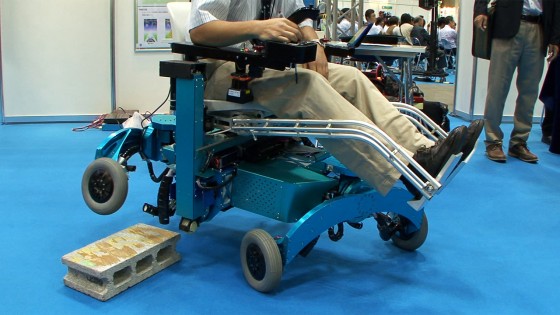
Robohub.org
Robotic wheelchair from Chiba Tech turns wheels into legs and climbs over steps

At the Chiba Institute of Technology, a group led by Shuro Nakajima has developed a robot wheelchair that can climb over steps.
This robot can make a variety of movements, using its four-wheel drive and five axes. Normally, it rolls along on its wheels, but if there’s a step or ditch, it can get over the obstacle by using its wheels as legs. All the user needs to do is tell it which direction to go, using a joystick. The robot automatically assesses the surrounding terrain and moves appropriately.
Also, when moving on uneven ground, the robot controls the seat to make sure it remains level.
“The robot has sensors on its feet, to see if there’s anything nearby. It can also see how far it is from a step. It actually has various sensors, and it uses them in combination, to assess how big a step is. Even if the sensors are in error, and the wheels touch an obstacle, the wheel torque can vary, so the robot can use that as back-up, too. In this way, the robot can detect the road surface reliably.”
“If a sensor detects a step, the robot calculates whether it can lift that leg. It can’t raise its wheels right away, so the steering system at the rear makes preparatory motions to gain stability. When the wheels can be raised stably, the robot lifts its legs.”
In addition, this robot can line its wheels up, and extend stabilizers to the left and right, enabling it to turn a circle. This makes it easy to reverse, even in a narrow space.
“We were particular about using wheels, because this kind of vehicle will mostly move on ordinary paved surfaces. The most efficient way of getting around on paved surfaces is to use wheels, like a car. So, this robot mainly uses wheels, but the wheels can become legs.”
“For now, we’re presenting this system and form as a concept, and the motion has mostly been worked out. So, we’re at the stage where we can show this robot to the world. In the next phase, we’ll get a variety of people to try it, so we can fine-tune the user experience.”





